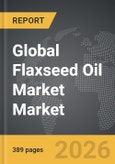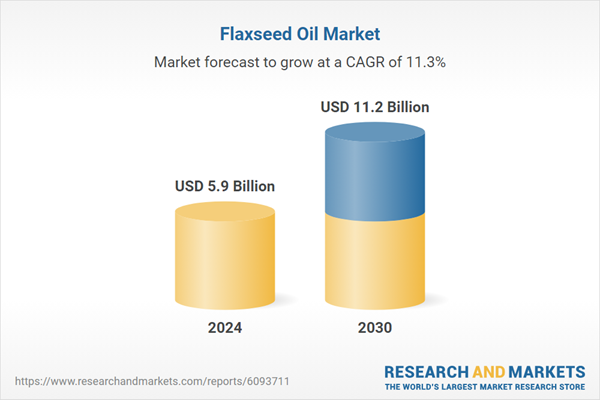Global Flaxseed Oil Market - Key Trends & Drivers Summarized
Why Is Flaxseed Oil Gaining Ground in the Health and Wellness Industry?
Flaxseed oil, long recognized for its rich nutritional profile, is experiencing a global surge in demand as consumers increasingly seek natural, plant-based health solutions. Derived from the seeds of the flax plant (Linum usitatissimum), flaxseed oil is especially prized for its high content of alpha-linolenic acid (ALA), a plant-based omega-3 fatty acid associated with numerous cardiovascular and anti-inflammatory benefits. As awareness of lifestyle-related diseases such as heart disease, diabetes, and obesity grows, consumers are shifting toward dietary supplements and functional foods that offer preventive health benefits. Flaxseed oil fits neatly into this category, being used in everything from smoothies and salad dressings to soft gel capsules. The rise in vegan and vegetarian populations worldwide has also amplified interest in flaxseed oil as a non-animal source of omega-3, which traditionally has been sourced from fish oil. This plant-based alternative not only aligns with ethical food choices but also appeals to consumers concerned about marine sustainability and heavy metal contamination found in some fish-derived oils. Furthermore, its versatility in both food and non-food applications - such as cosmetics, personal care products, and even wood finishes - has expanded its market potential. With growing interest in natural wellness and plant-based nutrition, flaxseed oil has become an essential product in the portfolios of health-conscious consumers and food product developers alike.How Do Shifting Consumer Preferences and Dietary Trends Influence Market Demand?
Global consumer preferences are rapidly evolving, and flaxseed oil is riding the wave of several intersecting trends that prioritize clean-label ingredients, functional nutrition, and holistic wellness. Modern consumers are increasingly label-savvy, looking for products free of artificial additives, preservatives, and genetically modified organisms. Flaxseed oil, especially when cold-pressed and organic, satisfies these expectations by offering a natural and minimally processed source of essential fatty acids. In regions like North America and Europe, the demand for organic and non-GMO food oils has skyrocketed, positioning flaxseed oil as a premium alternative to traditional cooking oils. Simultaneously, dietary movements such as keto, paleo, and whole-food plant-based diets emphasize high-quality fats, which has further propelled interest in flaxseed oil due to its favorable fatty acid profile. Another key factor influencing market dynamics is the growing popularity of personalized nutrition and nutraceuticals, where flaxseed oil is commonly included as a dietary supplement tailored for heart, skin, and cognitive health. This has led to a proliferation of flaxseed oil-based capsules and fortified food products in pharmacies, supermarkets, and online health platforms. In the Asia-Pacific region, where traditional medicine systems like Ayurveda and Traditional Chinese Medicine have long promoted flax and linseed for their health benefits, a resurgence in herbal wellness is creating new avenues for flaxseed oil adoption. Altogether, these consumer-driven trends are reshaping the global market landscape and encouraging innovation in product formats and delivery systems.What Technological and Agricultural Innovations Are Impacting Production Efficiency?
Technological and agricultural advancements are significantly improving the production, processing, and quality of flaxseed oil, enhancing its appeal in the competitive edible oil segment. On the agricultural front, the development of high-yield, disease-resistant flax cultivars is ensuring better crop reliability and increasing seed availability for oil extraction. Countries like Canada, Russia, and China - major producers of flaxseed - are adopting precision agriculture techniques to optimize cultivation practices, improve traceability, and ensure organic compliance. In terms of processing, cold-pressing and expeller-pressing technologies are being refined to retain maximum nutritional value, flavor, and shelf stability in the final oil product. Advanced filtration and nitrogen flushing systems are also being deployed to reduce oxidation and extend product shelf life without the use of synthetic preservatives. Furthermore, innovations in encapsulation technology are enhancing the bioavailability of flaxseed oil when consumed as a supplement, allowing for better absorption of ALA in the human body. Manufacturers are also exploring hybrid oils that combine flaxseed oil with other functional ingredients, such as turmeric or vitamin D, to create value-added wellness products. Packaging innovations, including UV-protective bottles and single-use sachets, are helping maintain product integrity while meeting consumer preferences for convenience. These technological developments are not only increasing production efficiency and quality assurance but also enabling producers to cater to niche consumer demands with greater precision and speed.Which Forces Are Powering the Expansion of the Global Flaxseed Oil Market?
The growth in the flaxseed oil market is driven by several factors rooted in technological progress, health-driven consumer behavior, and widening end-use applications across multiple industries. One of the most prominent drivers is the surge in consumer demand for plant-based omega-3 sources, especially among vegetarians, vegans, and environmentally conscious populations. The decline in fish oil consumption due to sustainability concerns, dietary restrictions, and taste preferences has opened up significant opportunities for flaxseed oil in the nutritional supplement sector. Additionally, the increasing incidence of lifestyle-related health conditions has prompted healthcare professionals to recommend omega-3-rich diets, creating a robust pipeline for nutraceuticals and therapeutic food products that incorporate flaxseed oil. The food and beverage industry is also integrating flaxseed oil into dressings, yogurts, smoothies, and bakery items as a functional ingredient, contributing to mainstream adoption. In the personal care and cosmetics sectors, flaxseed oil's anti-inflammatory and emollient properties are fueling its use in skincare and haircare formulations, particularly in natural and organic product lines. Furthermore, regional government support for oilseed crop cultivation and organic farming - especially in North America and parts of Europe - is strengthening the supply chain and encouraging small and medium-sized enterprises to enter the market. Online retail platforms and e-commerce channels are also playing a pivotal role by making premium flaxseed oil products more accessible to a broader consumer base. Collectively, these demand-side and supply-side drivers are creating a vibrant and diversified market ecosystem for flaxseed oil, enabling it to expand across both mature and emerging economies.Report Scope
The report analyzes the Flaxseed Oil market, presented in terms of market value (US$). The analysis covers the key segments and geographic regions outlined below:- Segments: Nature (Conventional, Organic); Distribution Channel (Supermarkets / Hypermarkets, Convenience Stores, Specialty Stores, Online, Other Distribution Channels); End-Use (Food, Cosmetics, Pharmaceuticals, Paints & Varnish, Flooring, Other End-Uses).
- Geographic Regions/Countries: World; United States; Canada; Japan; China; Europe (France; Germany; Italy; United Kingdom; Spain; Russia; and Rest of Europe); Asia-Pacific (Australia; India; South Korea; and Rest of Asia-Pacific); Latin America (Argentina; Brazil; Mexico; and Rest of Latin America); Middle East (Iran; Israel; Saudi Arabia; United Arab Emirates; and Rest of Middle East); and Africa.
Key Insights:
- Market Growth: Understand the significant growth trajectory of the Conventional Flaxseed Oil segment, which is expected to reach US$6.2 Billion by 2030 with a CAGR of a 9.5%. The Organic Flaxseed Oil segment is also set to grow at 13.9% CAGR over the analysis period.
- Regional Analysis: Gain insights into the U.S. market, valued at $1.6 Billion in 2024, and China, forecasted to grow at an impressive 15% CAGR to reach $2.3 Billion by 2030. Discover growth trends in other key regions, including Japan, Canada, Germany, and the Asia-Pacific.
Why You Should Buy This Report:
- Detailed Market Analysis: Access a thorough analysis of the Global Flaxseed Oil Market, covering all major geographic regions and market segments.
- Competitive Insights: Get an overview of the competitive landscape, including the market presence of major players across different geographies.
- Future Trends and Drivers: Understand the key trends and drivers shaping the future of the Global Flaxseed Oil Market.
- Actionable Insights: Benefit from actionable insights that can help you identify new revenue opportunities and make strategic business decisions.
Key Questions Answered:
- How is the Global Flaxseed Oil Market expected to evolve by 2030?
- What are the main drivers and restraints affecting the market?
- Which market segments will grow the most over the forecast period?
- How will market shares for different regions and segments change by 2030?
- Who are the leading players in the market, and what are their prospects?
Report Features:
- Comprehensive Market Data: Independent analysis of annual sales and market forecasts in US$ Million from 2024 to 2030.
- In-Depth Regional Analysis: Detailed insights into key markets, including the U.S., China, Japan, Canada, Europe, Asia-Pacific, Latin America, Middle East, and Africa.
- Company Profiles: Coverage of players such as Absolics Inc., AGC Inc., AvanStrate Inc., BOE Technology Group Co., Ltd., China Star Optoelectronics Technology (CSOT) and more.
- Complimentary Updates: Receive free report updates for one year to keep you informed of the latest market developments.
Some of the 44 companies featured in this Flaxseed Oil market report include:
- Archer Daniels Midland Company (ADM)
- Barlean's Organic Oils, LLC
- Bartoline Limited
- Bioriginal Food & Science Corp.
- Blackmores Limited
- Cargill, Incorporated
- ConnOils LLC (CoreFX Ingredients LLC)
- Fonterra Co-operative Group
- Glanbia PLC
- Gustav Heess GmbH
- Healthy Oilseeds LLC
- Henry Lamotte Oils GmbH
- Krishi Oils Limited
- Linwoods Health Foods
- Natrol LLC
- Nature's Bounty
- Nature's Way Products LLC
- NOW Foods, Inc.
- Pharmavite LLC
- Spectrum Organic Products LLC
This edition integrates the latest global trade and economic shifts into comprehensive market analysis. Key updates include:
- Tariff and Trade Impact: Insights into global tariff negotiations across 180+ countries, with analysis of supply chain turbulence, sourcing disruptions, and geographic realignment. Special focus on 2025 as a pivotal year for trade tensions, including updated perspectives on the Trump-era tariffs.
- Adjusted Forecasts and Analytics: Revised global and regional market forecasts through 2030, incorporating tariff effects, economic uncertainty, and structural changes in globalization. Includes historical analysis from 2015 to 2023.
- Strategic Market Dynamics: Evaluation of revised market prospects, regional outlooks, and key economic indicators such as population and urbanization trends.
- Innovation & Technology Trends: Latest developments in product and process innovation, emerging technologies, and key industry drivers shaping the competitive landscape.
- Competitive Intelligence: Updated global market share estimates for 2025, competitive positioning of major players (Strong/Active/Niche/Trivial), and refined focus on leading global brands and core players.
- Expert Insight & Commentary: Strategic analysis from economists, trade experts, and domain specialists to contextualize market shifts and identify emerging opportunities.
Table of Contents
Companies Mentioned (Partial List)
A selection of companies mentioned in this report includes, but is not limited to:
- Archer Daniels Midland Company (ADM)
- Barlean's Organic Oils, LLC
- Bartoline Limited
- Bioriginal Food & Science Corp.
- Blackmores Limited
- Cargill, Incorporated
- ConnOils LLC (CoreFX Ingredients LLC)
- Fonterra Co-operative Group
- Glanbia PLC
- Gustav Heess GmbH
- Healthy Oilseeds LLC
- Henry Lamotte Oils GmbH
- Krishi Oils Limited
- Linwoods Health Foods
- Natrol LLC
- Nature's Bounty
- Nature's Way Products LLC
- NOW Foods, Inc.
- Pharmavite LLC
- Spectrum Organic Products LLC
Table Information
| Report Attribute | Details |
|---|---|
| No. of Pages | 389 |
| Published | February 2026 |
| Forecast Period | 2024 - 2030 |
| Estimated Market Value ( USD | $ 5.9 Billion |
| Forecasted Market Value ( USD | $ 11.2 Billion |
| Compound Annual Growth Rate | 11.3% |
| Regions Covered | Global |









